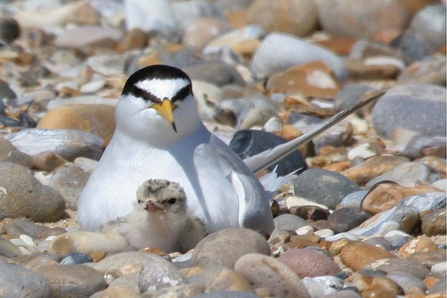
Little tern and chick by Margaret Holland
WildNet - Amy Lewis

Little tern and chick by Margaret Holland
Not all birds build their nests in hedges and trees. Some nest on beaches, including the little tern, ringed plover, and oystercatcher.
These species have all seen a decline in their population numbers, and they have been facing increasing threats in recent decades. One major problem is that beaches are being used more frequently as Essex's population rises. Since these species use the beaches to nest, and their eggs can be difficult to spot, it makes the eggs more prone to being accidentally stepped on. The increased human disturbance is a serious issue since it may lead to birds abandoning their nests, leaving the eggs and chicks vulnerable to predators and the elements.
These beach-nesting species are also threatened by rising sea levels and coastal floods brought on by climate change, which can wash away eggs and flood nests.
In collaboration with the RSPB, Bird Aware Essex, and the Essex Marine Police Unit, Essex Wildlife Trust’s campaign ‘Share our Shores’ urges the public to follow simple guidelines whilst they're enjoying the beach this summer to ensure endangered beach-nesting birds can lay their eggs and raise their chicks safely on the Essex coastline.
As we move into the warmer months, the nesting season for these species is well underway, with nest and chick sightings already made.
The public can help protect little terns and other beach-nesting birds by following these steps:
Alex Smith, Marine & Coastal Engagement Officer for Essex Wildlife Trust, says:
“The Share our Shores project is more important than ever as we are coming into summer when the coastal birds will be busy nesting. It’s been fantastic to see nesting ringed plovers, oystercatchers and little terns across a variety of coastal sites that we have signposted and roped off to help protect them from disturbance. We ask anyone visiting coastal areas to be respectful of nesting birds and all wildlife to help ensure a successful nesting season for these amazing animals.”
Download Share our Shores resources